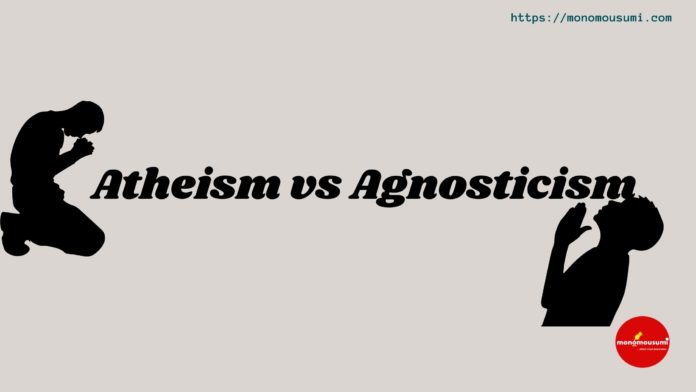“Religion without Science in blind and Science without Religion is lame”, said Einstein. Even great scientists have never discounted religion completely. People resort to religion when the human ingenious fails, say when medical treatment fails people resort to prayers. Contrastingly, there are even laymen, who don’t consider religion as worthy as it was considered by the former. This takes us to two contrasting concepts – theism (the idea that God exists) and atheism (the idea that God doesn’t exist. But human ideas are never free of contradiction and in line with this there is a concept which stands contrast to both theism and atheism, called as agnosticism (belief that nothing can be known about God). So, we can sophisticatedly place both theism and atheism on one side and Agnosticism on the other side of the same coin, the religion. In this essay we will try to decode Atheism and Agnosticism, ignoring theism. The reason behind ignoring theism is that theism as a concept is easily distinguishable from agnosticism but, atheism and agnosticism if seen on the surface seems to fall on the same side of a coin, but it’s not when we dig deeper.
DEFINING THE DIFFERENCE:
The question “Whether God exists?”, usually answered as either a ‘Yes’ or a ‘No’. An atheist will answer the question with a simple ‘No’. So,
Atheism can be understood as the lack of belief or disbelief in the existence of God.
But an agnostic will have neither of these two words as her/his answer. He/she may probably answer like, “I don’t know”, “Why should I care?”, In general, an agnosticism is a philosophy that claims that truth about certain things cannot be known. In the context of religion,
Agnosticism can be defined as a doctrine according to which the knowledge of humans cannot explain anything about the existence of God.
ORIGIN OF THE A’s:
Atheism as an ideology is not new per se, only it’s development as a form of representation or identity is new (not too old). For example, Buddhism does not recognize the existence of God and soul and this is an atheistic philosophy. As per 2011 census, there were around 29 lakh atheists in India. In 2016 Tim Whitmarsh, a Cambridge academic published a new book, which claims that atheism actually dates back to ancient polytheistic Greece. The book rejected that atheism is a modern invention as a result of Enlightenment.
The origin of Agnosticism goes back to the period when philosophical skepticism started. But the terms have been coined only during the second half of the 19th Century by T.H. Huxley.
Today, Atheism as a belief was much more developed than Agnosticism.
But the difference and relation between the two philosophies are not as simple as their definition and origin.
DIFFERENT BUT NOT EXCLUSIVE:
Usually, Agnosticism and atheism seem to fall on the same page but this is misleading. The relation between Atheism and Agnosticism is complex. It depends on the person or the society under consideration. Both of them have fundamental differences between them, but this doesn’t mean that they are exclusive. This statement might seem to be confusing. This can be understood through further discussion.
Consider a person X who doesn’t believe in God (atheist). The reason for this may be the person is not sure regarding the existence of God (agnostic). From this, a person can be both an atheist and also an agnostic. So, they are not completely exclusive. This is called an Agnostic Atheist.
On the other hand, Periyar E.V. Ramasamy was a staunch atheist. He has never been an agnostic in deciding the existence of god. So, here both atheism and agnosticism are fundamentally different.
Considering another case sociologists view religion as a socially constructed reality and they are interested in knowing why religion exists and not whether it exists. They believe in the proposition “Man created God as an answer to his intellectual and emotional needs”. For example, Emile Durkheim, a famous sociologist gave his own theory of religion and society where he stated the reasons for the emergence of religion. In this sense, we can say that almost all the sociologists are Agnostics. But whether they are Agnostic atheist or Agnostic theistic depends on the individual belief about God.
The terms Agnostic atheist and Agnostic theist used above directs us to another dimension regarding the comparison regarding the different types in atheism and Agnosticism.
STRONG, MODERATE AND WEAK:
There is no universally accepted classification of types of Agnosticism and Atheism. For comparison purposes both the concepts can be sophisticatedly classified in terms of their rigidity in belief as strong, moderate and weak.
For strong atheists, there are no gods, no matter what. They outrightly reject the existence of God. For strong agnostics the existence of God is unknowable in any situation. They have no idea whether God exists or not. Never will there be a change in their idea of no idea.
Moderate atheists tend to say that, there are almost certainly no gods and hence they don’t believe in gods. This is different from strong atheism in terms of rigidity. Strong atheists believe that non-existence of God is the truth of the universe. But moderate atheists tend to declare the non-existence of gods much more as their personal opinion. Unlike strong atheists, moderates don’t argue, though they were strong in their ideas. Moderate agnostics are of the opinion that there may or may not be God and they left it to anyone’s guess. This is different from strong agnostics who believe that the existence of God is always unknowable.
In the case of weal atheists and weal agnostics the rigidity in belief becomes much lesser comparatively. This means that their belief can be manipulated with proper information, say, an atheist can be changed to a theist if he/she was convinced that God exists. So, they are open to any possibility.
The relation between Atheism and Agnosticism can be derived from these differences too. The moderate and weak atheism are collectively called Agnostic Atheism. This is because despite their disbelief in God there is some amount of oscillation in their disbelief. Oscillation in belief is a characteristic of an agnostic, hence the classification Agnostic Atheism.
SIMILARITIES BETWEEN THE TWO:
Comparison between any two contrasting elements cannot be concluded without mentioning their similarities.
Both Atheism and Agnosticism can be seen as a sign of increasing secularization in any country, though this is not the only sign of the secularization process.
Another important similarity is that in both Atheism and Agnosticism, there is a lack of belief in the divine. Atheism rejects God directly and outrightly, on the other hand Agnosticism too rejects God but on the basis of skepticism.
So, the thin line that separates the two philosophies is skepticism. Either strong, moderate or weak, agnostics always have an element of skepticism in their belief about God unlike atheists, for whom skepticism has no place in their belief. With increasing rational thoughts among the people in his modern era, the two concepts tend to grow in their volume faster than before. Atheism has grown much faster and now it is widespread, compared to Agnosticism. So, a clear line of separation between the two or a clear-cut difference between the two concepts will become an attractive area of study for scholars only when there is a substantial increase in people subscribing to Agnosticism
By SIVA SHANKAR A
















